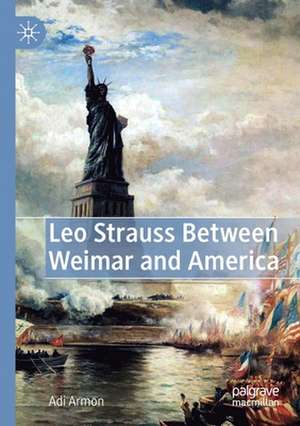Leo Strauss Between Weimar and America
Autor Adi Armon Traducere de Michelle Bubisen Limba Engleză Paperback – 8 oct 2020
This is the first book-length examination of the impact Leo Strauss’ immigration to the United States had on this thinking. Adi Armon weaves together a close reading of unpublished seminars Strauss taught at the University of Chicago in the 1950s and 1960s with an interpretation of his later works, all of which were of course written against the backdrop of the Cold War. First, the book describes the intellectual environment that shaped the young Strauss’ worldview in the Weimar Republic, tracing those aspects of his thought that changed and others that remained consistent up until his immigration to America. Armon then goes on to explore the centrality of Karl Marx to Strauss’s intellectual biography. By analyzing an unpublished seminar Strauss taught with Joseph Cropsey at the University of Chicago in 1960, Armon shows how Strauss’ fragmentary, partial engagement with Marx in writing obscured the important role that Marxism actually played as an intellectual challenge to his later political thinking. Finally, the book explores the manifestations of Straussian doctrine in postwar America through reading Strauss’ The City and Man (1964) as a representative of his political teaching.
| Toate formatele și edițiile | Preț | Express |
|---|---|---|
| Paperback (1) | 580.36 lei 43-57 zile | |
| Springer International Publishing – 8 oct 2020 | 580.36 lei 43-57 zile | |
| Hardback (1) | 585.26 lei 43-57 zile | |
| Springer International Publishing – 8 oct 2019 | 585.26 lei 43-57 zile |
Preț: 580.36 lei
Preț vechi: 682.77 lei
-15% Nou
Puncte Express: 871
Preț estimativ în valută:
111.05€ • 116.24$ • 92.43£
111.05€ • 116.24$ • 92.43£
Carte tipărită la comandă
Livrare economică 31 martie-14 aprilie
Preluare comenzi: 021 569.72.76
Specificații
ISBN-13: 9783030243913
ISBN-10: 3030243915
Pagini: 226
Ilustrații: IX, 226 p. 1 illus.
Dimensiuni: 148 x 210 mm
Greutate: 0.32 kg
Ediția:1st ed. 2019
Editura: Springer International Publishing
Colecția Palgrave Macmillan
Locul publicării:Cham, Switzerland
ISBN-10: 3030243915
Pagini: 226
Ilustrații: IX, 226 p. 1 illus.
Dimensiuni: 148 x 210 mm
Greutate: 0.32 kg
Ediția:1st ed. 2019
Editura: Springer International Publishing
Colecția Palgrave Macmillan
Locul publicării:Cham, Switzerland
Cuprins
Chapter 1: Introduction.- Chapter 2: The Political Philosophy of Strauss--Its Basis and Its Genesis.- Chapter 3: Strauss' Marx.- Chapter 4: Note on the Plan of Strauss' The City and Man.- Chapter 6: Epilogue.
Notă biografică
Adi Armon is a Visiting Assistant Professor with the George L. Mosse Program in History at the University of Wisconsin-Madison, USA.
Textul de pe ultima copertă
This is the first book-length examination of the impact Leo Strauss’ immigration to the United States had on this thinking. Adi Armon weaves together a close reading of unpublished seminars Strauss taught at the University of Chicago in the 1950s and 1960s with an interpretation of his later works, all of which were of course written against the backdrop of the Cold War. First, the book describes the intellectual environment that shaped the young Strauss’ worldview in the Weimar Republic, tracing those aspects of his thought that changed and others that remained consistent up until his immigration to America. Armon then goes on to explore the centrality of Karl Marx to Strauss’s intellectual biography. By analyzing an unpublished seminar Strauss taught with Joseph Cropsey at the University of Chicago in 1960, Armon shows how Strauss’ fragmentary, partial engagement with Marx in writing obscured the important role that Marxism actually played as an intellectual challenge to his later political thinking. Finally, the book explores the manifestations of Straussian doctrine in postwar America through reading Strauss’ The City and Man (1964) as a representative of his political teaching.
Caracteristici
Opens a new path to understanding Straussian political philosophy Draws a more complete picture of Strauss's complex thinking than has previously existed Raises new questions about Strauss's life and thought
